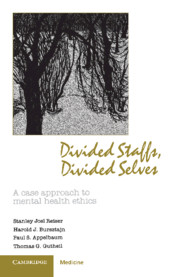Book contents
- Frontmatter
- Contents
- Acknowledgments
- About the authors
- 1 Introduction
- 2 New problems, new ethics: challenging the value structure of health care
- 3 Conflict and synthesis: the comparative anatomy of ethical and clinical decision making
- 4 Solving clinical puzzles: strategies for organizing mental health ethics rounds
- CASES IN MENTAL HEALTH ETHICS
- I Informed consent, competency, and involuntary treatment
- II Confidentiality
- III Truth-telling
- IV Managing difficult patients
- V Parents and children
- VI Religion and mental health treatment
- VII Allocation of resources
- VIII Research
- IX Mental health and medical illness
- X Mental health and criminal justice
- Bibliography
- Index
VII - Allocation of resources
from CASES IN MENTAL HEALTH ETHICS
Published online by Cambridge University Press: 06 July 2010
- Frontmatter
- Contents
- Acknowledgments
- About the authors
- 1 Introduction
- 2 New problems, new ethics: challenging the value structure of health care
- 3 Conflict and synthesis: the comparative anatomy of ethical and clinical decision making
- 4 Solving clinical puzzles: strategies for organizing mental health ethics rounds
- CASES IN MENTAL HEALTH ETHICS
- I Informed consent, competency, and involuntary treatment
- II Confidentiality
- III Truth-telling
- IV Managing difficult patients
- V Parents and children
- VI Religion and mental health treatment
- VII Allocation of resources
- VIII Research
- IX Mental health and medical illness
- X Mental health and criminal justice
- Bibliography
- Index
Summary
“DO NOT RESUSCITATE” FOR THE LIVING
The responsibilities of staff and society to a deinstitutionalized patient, at an acute psychiatric facility.
The patient is a 50-year-old man with a diagnosis of mental retardation and a concomitant depression, as well as epilepsy. He has been an inpatient for the last three years at a community mental health center (CMHC), to which he was transferred from a large state hospital. He was the illegitimate child of alcoholic parents and has been a ward of the state since he was 3. Since that move two nursing home placements have been attempted, neither of which lasted longer than a month. According to the latest treatment plan, the patient requires services and training in the following problem areas: retardation and depression, personal hygiene, need for a citizen advocate to ensure availability of services, routine medical and psychological evaluations, grooming, eating, weight loss, chronic obstructive lung disease, seizure and movement disorder, obsessive concerns with death, a tendency toward masturbatory self-stimulation in public settings, the need to increase production rate at work, functional academic training, skills for self-preservation in society, learning of social skills, dentures, home placement.
The patient's transfer to the mental health center was part of a plan by the state's department of mental health to close down several units at the state hospital and to deinstitutionalize a number of patients. The review team in charge of this process of transfer determined that this patient and another had the greatest potential of all for development.
- Type
- Chapter
- Information
- Divided Staffs, Divided SelvesA Case Approach to Mental Health Ethics, pp. 109 - 114Publisher: Cambridge University PressPrint publication year: 1987



